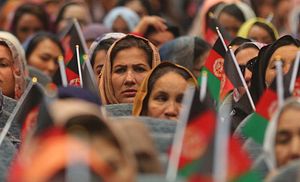On the surface, Nasiba from Afghanistan and Formin from Myanmar have little in common. Nasiba grew up in the city of Kabul, while Formin is from a remote village in the Maungdaw district of Rakhine state. But take a closer look, and they become sisters in the universal struggle for women’s rights and equal participation in the social, political, and economic life of their countries. And that struggle requires continued investment and support from the United States and the international community.
The worlds they must navigate are not easy. Women and girls in Afghanistan face lack of equal access to educational opportunities due to threats of violence and harassment, poverty, and long distances to the closest school. While women in Myanmar, on average, have much higher literacy rates than Afghan women, there are immense economic, regional, and urban-rural disparities.
When it comes to economic participation, violence affects Afghans’ attitudes toward women’s inclusion, which in turn impacts Afghanistan’s ability to grow its economy. For women in Myanmar, their participation in the economy is concentrated in the informal sector, with concerns about poor pay and working conditions, long hours, sustainability, and lack of protection under the law.
Supporting women’s education and economic empowerment — and gender equality overall — is important for the future of both countries.
We know that when women are educated, they are more likely to become gainfully employed, raising the income of the entire household. We also know that gender equality is critical to a country’s economic growth and stability. And perhaps most importantly, gender equality and women’s economic empowerment have strong ties to prosperity and peace.
Organizations like the Asian University for Women (AUW) in Chittagong, Bangladesh and the George W. Bush Institute in Dallas, Texas are committed to providing women and girls with the tools they need to tackle these challenges and more.
Founded in 2008, AUW has developed a unique model for educating and empowering the next generation of women leaders across Asia and the Middle East. In its admissions and scholarship programs, AUW prioritizes women who are first in their family to enter university. It particularly targets marginalized communities and provides two years of on-campus college preparatory classes prior to their entry into the undergraduate program. As a regional institution with 100 percent of its graduates returning to their home countries, AUW exemplifies a model of cultivating knowledge, skills, and empowerment within the region and retaining these future leaders.
AUW students Nasiba and Formin exemplify how powerful access to quality education can be in creating opportunities for young women. Nasiba intends to study economics at university and hopes to provide economic opportunities to her community as an entrepreneur. Formin aspires to become a lawyer, focusing on the plight of her people, the Rohingya minority of Myanmar. Since 2017, over 730,000 Rohingya have crossed the border into Bangladesh to flee atrocities committed against them by the military.
As young women like them build on their education and move forward in their careers, continued training and mentorship is essential to ensuring access to quality jobs and leadership positions.
At the George W. Bush Institute, the model for advancing women’s leadership and human rights is based on shared learning and mutual exchange, safe spaces to have conversations about their country’s and/or region’s challenges and successes, and exposure to inspirational leaders and different methods of tackling pressing challenges. The Institute implements this vision through its Liberty & Leadership program (LLP) for young scholars leading change during Myanmar’s democratic transition, and the WE Lead program for mid-career women advancing economic opportunity in the Middle East, North Africa, and Afghanistan.
LLP scholar, Evelyn, saw that women in her community did not have agency to work outside the home, and those who did were paid a very low wage. To address this challenge, she is working to provide jobs to women producing traditional clothing. Afghan WE Lead scholar, Homa, identified a similar challenge for women in her province. In addition to serving as director of a local NGO focused on women’s economic empowerment, she started her own embroidery and clothing business to empower women in rural areas.
Despite facing immense challenges in their countries, Afghan and Burmese women are incredible leaders with a thirst for knowledge, and the persistence and courage to make a positive impact in their communities and countries. The United States and the international community must continue to invest in women and girls like Nasiba, Formin, Evelyn, and Homa through targeted scholarship programs and funding for training and mentorship, for example. On International Women’s Day and beyond, this is essential – for the advancement of women, for the advancement of society, and for advancement of the world.
Kamal Ahmad is the founder of the Asian University for Women (AUW).
Farhat Popal is senior program manager of the Bush Institute’s Women’s Initiative.

































